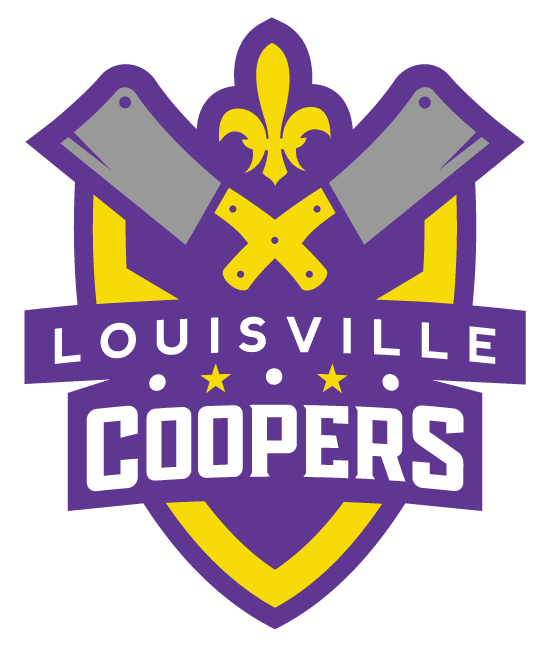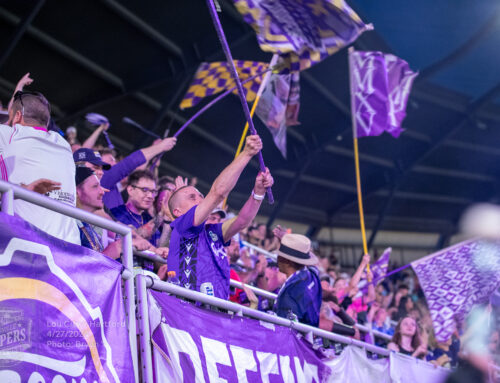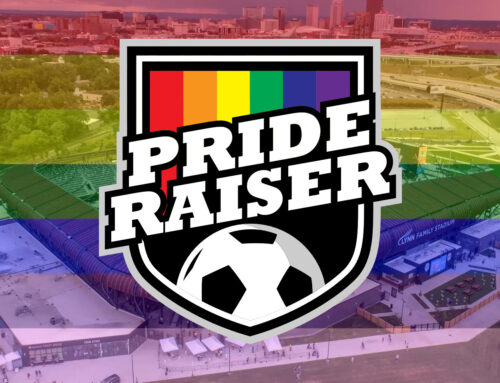 According to Bob Williams, an intrepid soccer writer from North Carolina and apparently now a writer at SportBusiness.com, “Louisville City FC will evaluate over the next six to 12 months whether to apply for a Major League Soccer expansion slot and what that process would entail.”
According to Bob Williams, an intrepid soccer writer from North Carolina and apparently now a writer at SportBusiness.com, “Louisville City FC will evaluate over the next six to 12 months whether to apply for a Major League Soccer expansion slot and what that process would entail.”
My first guess about “what that process would entail” is “finding a new investor with an individual net worth about $1 billion” or more, something Soccer Holdings, LLC doesn’t quite have at the moment. That big financial component isn’t written in stone, probably, as MLS is probably comfortable with just about anyone that can stroke a check for a quarter-billion dollars for the expansion fee. However, the ghosts of NASLs past have kept MLS in its single-entity structure with its salary caps and gradual approach to growth since its inception. They’re a conservative bunch, by and large, and they don’t like taking on risks, especially financial ones, without the possibility of a high return.
Louisville is not New York or Los Angeles or Houston or Miami. It’s not a big media market. It’s not a super-wealthy city. Therefore, the return on adding Louisville to MLS isn’t going to set cash registers alight with activity. What it does do, however, could be more strategic from an MLS perspective.
MLS isn’t the NFL; it’s almost more akin to the NBA in terms of the reach of its clubs: it’s almost hyper-localized. The NBA is super popular, but that popularity is highly concentrated in the cities where its teams play, and the spread isn’t all that broad. The NFL, and Major League Baseball, is much more regional, drawing fans from counties far outside the city centers they play in.
MLS knows this, and while they may pine one day to have such sway, they know there aren’t going to be Nashville fans very far away from Nashville, or FCC fans much outside of Hamilton County, Ohio and the Boone-Kenton-Campbell conglomeration just across the river. But if the league wants to grow, it needs to go where the soccer fans are.
Enter Louisville. We, the Coopers, Soccer Holdings, LLC, the Heretics, Derby City Ultras, Scouse’s House, the Black Sheep, Teletubbies, City Dads, the list goes on, are well-embedded in Louisville. The club went from playing on a minor league baseball field (a nice one, to be fair) to playing in a fabulous, state-of-the-art stadium, building the best training fields to be occupied by any USL club and probably any NWSL club, jumpstarting a budding and productive academy, being the winningest USL club since entering the league, and joining NWSL in the span of eight years. We’ve already got built-in rivalries with two of the league’s newer clubs, FC Cincinnati and St. Louis Whatever They’re Calling Themselves, and Nashville SC is close by.
I don’t care who you are, that’s impressive. City, Racing, Soccer Holdings, and we fans did all of that without the promise of ever playing first division men’s soccer in this country. Yeah, the carrot did dangle in front of us a few times. But this is the first time the ownership has ever intimated to anyone outside of their circle that they might be looking up to bigger things.
There are obviously no guarantees that, if Soccer Holdings were to submit a bid, it would be accepted. There’s no guarantee that Soccer Holdings can snare an investor that would meet MLS’s requirements. There’s no guarantee that Soccer Holdings is even ready to go that far. There’s a lot left to do and discuss before this conversation even really needs to happen in earnest. But I defy anyone to point to another club, group of supporters, or city that’s done it better than we have.
Yes, we can look up the river and see Cincinnati as a cautionary tale of what can happen when you try to fly too close to the sun. But it’s important to consider that an NFL ticket executive was, and in some ways still is making player personnel decisions for that team. Louisville City and Racing Louisville have some institutional advantages, i.e. James O’Connor, John Hackworth, Christy Holly, Danny Cruz, and Mario Sanchez, in place now that I would argue can overcome some of those problems.
I doubt I’ll convince anyone adamantly opposed that moving to MLS is a good idea. I understand that point of view, and share it in several instances. Getting bigger likely means losing some of the things that I love about Louisville City and Racing. I doubt I’ll have nearly the same amount of access to club employees that I have now if they have to add more money and staff and layers between decision makers and fans of the club. New investors inevitably would lead to changes in the way the club does things because when you write big checks, you tend to want to make big decisions and changes.
But it’s hard to argue such a move wouldn’t be good for the club. It’s got so much going for it. There are lots of problems with MLS, to be sure. But if you can remove yourself from all the public relations gaffes and inferiority/superiority complexes that exist in MLS fans and all the insane league rules, you know it’s a better soccer league than the one we’re currently in.
It’s got warts, yeah. Every league does. But you know what it’s also got? Away days to Cincy, Nashville, and St. Louis again. Admit it – you miss those. It’s got the chance to play in international competitions. It’s got a business model that can actually turn a profit – not important to us, but very important to the owners.
I’m happy to watch Louisville City play anyone. I’d like them to reach as high as they possibly can. If that’s MLS, okay, I’m in.













